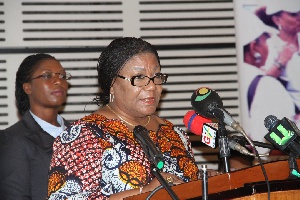First Lady Mrs. Rebecca Akufo-Addo has launched the “Reducing Malaria and Malnutrition" initiative as part of efforts to encourage participation of communities across Ghana to help address incidents of malaria and malnutrition especially among the most vulnerable members of our population.
Launching the initiative, the First Lady stated that throughout her work with Infanta Malaria Prevention Foundation, she has realized that Malaria and malnutrition are two of the critical conditions that have had negative influence on our vulnerable population for years. These effects she stated ranges from “untimely death of children, pregnant women and other vulnerable groups from malaria, to stunting, decreased ability to learn and reduced school performance among children as a result of malnutrition.”
She further stated that for pregnant women especially, “if left untreated, malaria can result in anaemia, low birth weight and permanent disabilities such as blindness”. She noted that for these conditions that are preventable “it is not acceptable that in this day and age, Ghana should lose any child or pregnant woman to malaria or under-nutrition.”
The First Lady further noted that the burden malaria and malnutrition place on our national economy despite significant gains in recent times is still enormous therefore much more needs to be done by both the public and private sector to prevent these conditions as soon as possible.
She proposed that to prevent these conditions she believes stakeholders have to work together with two clear objectives; “to contribute to reducing by a third, the proportion of both malnourished and severely malnourished children, under the age of five years in Ghana from 2016 levels by the end of 2020 and to contribute to the reduction of malaria in pregnant women and children under age five from selected communities and suburbs by end of 2020.”
The First Lady stated that she believes the Community based Health Planning and Services (CHPS) concept will be key in addressing malnutrition and malaria since it has the ability to reach many malnourished children through household follow ups and coordination with community health volunteers.
She urged all stakeholders to commit to scale-up effective malaria prevention activities and treatment interventions, invest in breastfeeding and child nutrition, establish systems and ways to protect breastfeeding and seek to improve availability of food for children.
She therefore asked for the support of caregivers in the households, community leaders, queen mothers and chiefs, district, regional and national heads of departments in food and agriculture, community health nurses, disease control and surveillance officers, clinical and public health leadership, Ministries for Gender, Children and Social Protection, Finance and others to ensure the initiative becomes successful.
Health News of Tuesday, 30 May 2017
Source: www.ghanaweb.com

















